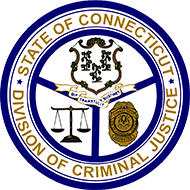Chief State’s Attorney’s Meeting
Minutes of the Meeting of February 10, 2014
Office of the Chief State’s Attorney
Rocky Hill, Connecticut
The meeting was called to order at 12:49 p.m. by Chief State’s Attorney Kevin T. Kane.
In attendance were: State’s Attorneys David I. Cohen (Stamford-Norwalk), Michael Dearington (New Haven); Patricia M. Froehlich (Windham), Matthew C. Gedansky (Tolland), Gail P. Hardy (Hartford), Kevin D. Lawlor (Ansonia-Milford), Peter A. McShane (Middlesex), Maureen Platt (Waterbury), Michael L. Regan (New London), Stephen J. Sedensky III (Danbury), David Shepack (Litchfield) and John Smriga (Fairfield); Deputy Chief State’s Attorneys Leonard C. Boyle and John J. Russotto; and Supervisory Assistant State’s Attorney John H. Malone (New Britain).
Also present: Executive Assistant State’s Attorneys Brian Austin, Jr., and Michael A. Gailor, Division of Criminal Justice legislative liaison Wilfred Blanchette and DCJ Communications and Legislative Specialist Mark A. Dupuis.
State’s Attorney Froehlich made a motion to approve the minutes of the January 13, 2014, meeting. The motion was seconded by State’s Attorney Cohen and passed unanimously.
Supervisory Assistant State’s Attorney Francis J. Carino (Statewide Juvenile Matters) requested guidance for training police on how juveniles should be identified in police reports or affidavits for arrest or search warrants. It was agreed that pseudonyms (i.e., “Juvenile #1,” “JV1”) should be used and the name included in a supplemental report subject to confidentiality provisions.
Deputy Chief State’s Attorney Russotto introduced Jan Gwudz, Director of the Connecticut State Employees Campaign, and Peggy Gray, campaign Vice Chair, for a presentation on the CSEC. State’s Attorney Regan spoke on his office’s participation in the CSEC.
Assistant Attorney General Steven Strom and Department of Correction Lieutenant Dominic Pisano gave a presentation and discussion related to accessing recordings of monitored inmate telephone calls and visits.
Wilfred Blanchette reported on the 2014 legislative session. The State’s Attorneys are asked to review and evaluate legislative proposals as the session progresses.
State’s Attorney Dearington initiated a discussion of the appropriate use of ex parte orders and search warrants for obtaining telephone or internet records.
Deputy Chief State’s Attorney Russotto reported that the Division budget will be reviewed at an Appropriations Committee public hearing on February 19, 2014. Subcommittee review will be at a later date.
Chief State’s Attorney Kane distributed a letter from Victim Advocate Garvin Ambrose concerning written orders of restitution in criminal cases.
State’s Attorney Froehlich reported for the Training Committee. State’s Attorneys are asked to submit suggested topics for the June 12, 2014, four-hour training program as part of the Annual Professional Development Conference for Prosecutors. Planning continues for the second, full day of training to be Friday, June 13, 2014, at Central Connecticut State University in New Britain.
State’s Attorney Platt called attention to training being provided to law enforcement by the Department of Children and Families with regard to “drug endangered children,” and the potential impact on certain criminal investigations.
Chief State’s Attorney Kane distributed an Office of Legislative Research report on disposition of operating without insurance cases for review by the State’s Attorneys.
Executive Assistant State’s Attorney Austin reported that the Freedom of Information Commission has issued a decision that pardon applications and related documents are public records. The Division will request such information either via FOI, through agreement with the Board of Pardons and Paroles or through legislative action.
State’s Attorney Dearington reported on requests asking State’s Attorneys to support pardon applications to allow convicted felons to avoid deportation. It was agreed such requests should be decided on a case-by-case basis.
Executive Assistant State’s Attorney Austin reported on ongoing efforts to reduce the large volume of case records in storage. The Division is attempting to dispose of records of class C or D felonies as well as unclassified felonies disposed prior to 1992.
The meeting was adjourned at 3:05 p.m. on a motion by State’s Attorney McShane, seconded by State’s Attorney Froehlich and passed without opposition.

